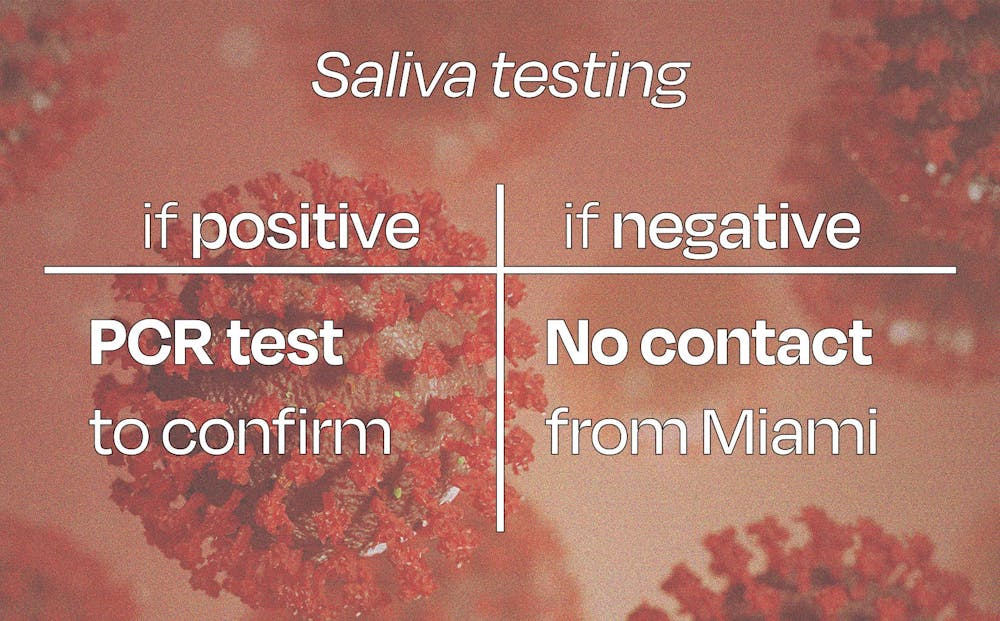In addition to requiring both on- and off-campus students to be tested for COVID-19 before they attend in-person class, Miami University has made several other changes to its virus testing protocols.
Before classes began, off-campus students received their saliva COVID-19 test at Harris Hall, while on-campus students received a nasal swab in the Millett Hall parking lot before being permitted to move into their residence hall, said Jayne Brownell, vice president for student affairs.
At the time of their move-in tests, students received a card that confirms they complied with move-in testing regulations. This semester, students may be asked to present this card to a professor as proof of their cooperation if they are attending an in-person class, Brownell said.
Maggie Dicks is a sophomore biology and public health major who recently moved into Hamilton Hall. Although Dicks received her COVID test at Millett, she said she is not a fan of asymptomatic testing.
“I know that it prevents the spread, but I just feel like in healthy college students, we don't need to take up all of these tests,” Dicks said. “I feel like they could be better used elsewhere.”
Preston Collins, a junior biochemistry major, believes it was a good idea for the university to conduct move-in testing.
“It's kind of the only sure way that we can know whether or not COVID is going to be a problem this semester,” Collins said. “If everybody just does their part, then it shouldn't be a big deal.”
As the semester continues, so will the COVID tests. According to Miami’s Healthy Together website, there will be both student wide-net testing and surveillance testing. For surveillance testing, students will be tested with non-equal probability based on where positive cases
already are and the amount of people they live with.
Brownell said that testing those who are more likely to be exposed to positive cases due to their living situations is how the university can utilize its resources most effectively.
This semester, when students are asked to participate in surveillance and wide-net testing, they will now be given a saliva test at Harris Hall. Brownell said these tests will allow the school to notify students of a potential positive case faster than before.
“We will use saliva testing more broadly because it gives us more rapid results,” Brownell said. “I would say that we're going to be able to do some increase in testing, but more, it is going to be an increase in speed.”
Enjoy what you're reading?
Signup for our newsletter
If a student’s saliva test is negative, they will not be notified at all, according to a mass email sent from the Division of Student Life.
If a student's results come back positive for COVID-19 after taking a saliva test, they will be notified, asked to isolate and then will receive a second, higher-accuracy polymerase chain reaction (PCR) test to confirm they are actually positive for the virus, said Brownell.
According to Miami’s Healthy Together website, the PCR test will take the form of either a nasal or throat swab.
Collins said he heard about this return testing method through the Division of Student Life’s emails and questions the university’s choice to have students return for a second test.
“I think that's kind of silly,” said Collins. “I think I'd make a bit more sense if you just give the nasal [test] to begin with.”
Brownell said the purpose of the rapid test is to notify students of a likely positive right away so they can isolate while they wait for more accurate results.
Students who are experiencing COVID-19 symptoms can also be tested for the virus at Harris Hall, but in a separate area than those participating in asymptomatic testing, Brownell said.
In addition to student testing, this semester, Brownell said the university is also increasing testing for select staff. These staff include those work in or live in residence halls, as well as those who operate the dining halls.
She said that so far, the testing program has had good compliance.
“There's only so much Miami could do to keep you safe, but you have to take action for yourself, as well,” Brownell said. “My hope for the testing program is that people get tested when they're asked to be tested, and that they then take those results seriously.”




